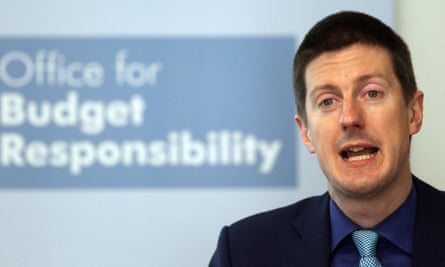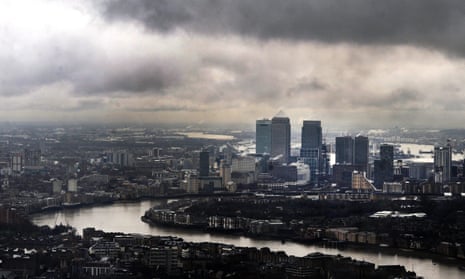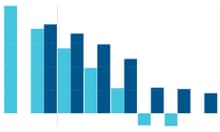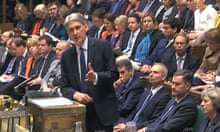Weaker business spending and a squeeze on consumers from higher inflation will dent the UK economy next year, but warnings for a post-referendum recession should prove unfounded, according to the government’s independent forecasters.
The Office for Budget Responsibility was forced to revise down its prediction made before the Brexit vote that GDP would rise 2.2% next year. It now sees the economy expanding by only 1.4% and warns there will be a knock-on effect on the public finances.
That forecast was a touch more positive than the picture painted by other forecasters such as the International Monetary Fund, and the UK chancellor, Philip Hammond, was quick to point out in his autumn statement that it would leave Britain outperforming France and Italy next year and possibly Germany too.
The OBR said the main factors behind its gloomier outlook for growth next year and in 2018 stemmed from Brexit vote effects, including the pound’s sharp drop since the referendum, which has raised the cost of imports to the UK.
Presenting the fiscal watchdog’s first set of forecasts since March’s budget, OBR chairman Robert Chote highlighted that they were subject to a large degree of uncertainty as the UK prepares to embark on Brexit negotiations.
In order to factor in the impact of that process and of the UK eventually leaving the EU, the OBR had made some “broad brush judgments”, he said. Those included an assumption that the UK would leave the bloc in April 2019 and that the Brexit process would hit net migration and trade.
“We expect the quarterly growth rate of GDP to continue slowing into next year, as uncertainty over the UK’s future trade and migration regime delays business investment and as the fall in the pound squeezes real consumer spending by pushing up inflation,” said Chote.
“But growth remains positive – we have not assumed more aggressive job shedding or a jump in precautionary saving, both of which pose downside risks if the road to Brexit is bumpy.”
The growth forecast for 2018 was cut to 1.7% from 2.1% back in March, but growth is expected to recover to 2.1% in 2019 and 2020, the same as previous forecasts.
Chote noted that the OBR’s outlook was more optimistic than the average of other forecasters. The Bank of England, for example, also predicts growth will slow to 1.4% next year but then sees barely any improvement in 2018, with GDP expanding just 1.5%. The IMF forecasts UK growth of 1.1% next year.
The tone reflects signs of resilience in the early economic indicators since the Brexit vote. Consumer spending has continued to grow apace, economic growth was stronger than expected and unemployment has dropped to an 11-year low.
Ian Stewart, chief economist at Deloitte, said the OBR’s outlook reflected that picture.
“The OBR sees Brexit taking a smaller chunk out of UK growth than many feared in the wake of the referendum. The fact that the OBR’s growth forecast for 2017, at 1.4%, is above current market estimates and twice as high as the market expected in July, testifies to the resilience of the UK economy,” he said.

But the group Economists for Brexit was critical of the OBR’s outlook as too downbeat.
“Whilst it acknowledges the fact that the decision of the government’s chosen path is uncertain, it then applies what amounts to an arbitrary Brexit penalty on the UK economy without any proper justification,” said Patrick Minford, the group’s co-chair.
“Why does it assume lower productivity, a spending slowdown due to uncertainty and lower immigration?”
The OBR said in its assumptions around Brexit that productivity growth – already an area where the UK underperforms other big economies – would be hurt by weaker investment. It also flagged that the outlook for productivity growth remained the biggest and most important uncertainty around its projections for the government coffers.
“For all the attention it will receive now, Brexit has not supplanted this uncertainty. It has simply added to it,” said Chote.
On trade, the OBR predicts the weak pound will boost net trade over the next two years, with UK exports more competitive in overseas markets and imports to the UK less attractive relative to domestically produced goods and services. But longer-term it warns exiting the EU will reduce growth in exports and imports.
The OBR also sees the UK adopting tighter immigration controls and becoming less attractive as a destination for immigrants, with knock-on effects for economic growth and the public finances. “Our net inward migration assumption is unchanged since March, but we would have increased it by about 80,000 a year in the absence of the referendum,” said Chote.
Such an increase in net migration “would have boosted tax revenue by more than it would have raised spending”, he said.









